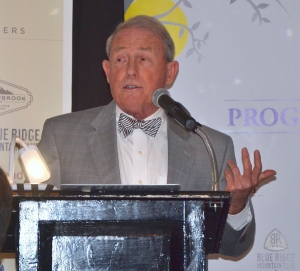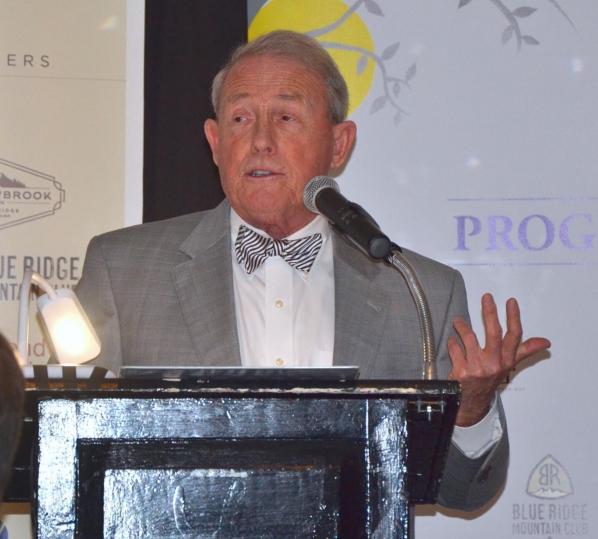BLOWING ROCK — The nation is in its 11th year of economic expansion and there is “not a recession in sight,” according to local economist Harry Davis.
“I’m very positive about this year for the state and nation in terms of economic growth,” said Davis, who is also an Appalachian State University professor. “It’s a great time to be alive in this country. It’s a great time to be part of the economy and be in part of the state that we’re living in.”
Davis announced his 2020 economic forecast during the fourth annual High Country Economic Kickoff Breakfast — presented by the Boone Area and Blowing Rock Chambers of Commerce — on Jan. 16 at Meadowbrook Inn. Sponsors for the event included Peak Insurance Group, 4 Forty Four and Allen CPA PLLC.
Davis said that 2019 gross domestic product growth was down from 2018, and that the growth is right at 2 percent currently. He added that the stock market had been great, and that corporations have repurchased nearly $5 trillion worth of stock since the Great Recession.
While a nation-wide recession is not in his prediction, Davis said the manufacturing sector may experience a “mini recession.” According to Davis, business investment is low as it remained negative throughout 2019. What is driving the economy currently are retail sales and consumer spending; Davis said consumer confidence is presently at a high.
The housing market and the net worth of Americans are both trending positively. Davis said net worth is at its highest level in history. He added that through November 2019, residential construction was up 13 percent. While the economy has seen a trend in the construction of apartments, single-family buildings are starting to increase again.
Davis did say that in a number of college towns across the nation, the cost of living in an apartment is more expensive than tuition to attend college. Adding to this, the amount of student loan debt that people are accruing is what may be causing many to put off purchasing a household and “forcing people to not get married,” Davis said.
“We have got to do something about the student loan debt,” Davis said. “It’s like a drag on the economy.”
Also contributing to a better housing market is a low unemployment rate, Davis said, since in November the state had a 3.8 percent rate. According to Davis, the state created about 90,800 jobs during the last 12 months ending in October. Tourism, transportation, health services and education were areas that Davis identified with potential for job growth.
For Watauga County, Davis said the growth in tourism jobs was beneficial, but that it could be an issue as well. This could be due to the lower pay that may be associated with tourism jobs, he said.
Appalachian Ski Mtn. President Brad Moretz gave attendees an overview of the changes in winter tourism in the area. Blowing Rock went from a town that was lively in the summer with only one motel and one restaurant that stayed open in the winter during the 1950s, to now only one of 26 restaurants closes for the season with people visiting from all over the nation to ski. During the Christmas holiday, Moretz said Appalachian Ski Mtn. served patrons from 46 states and numerous other counties.
To continue to grow tourism in Watauga County — especially in the winter — Moretz said businesses need to start utilizing more online sales platforms and online lodging platforms (like Airbnb). He said Appalachian Ski Mtn. has now installed two dozen computer check-in kiosks, and has noticed that more people are renting their equipment online prior to arrival.
“One third of the lodging revenues of the county come from internet-based lodging providers … It’s going to get larger,” Moretz said.
He added that Asheville is nationally known for its Airbnb usage.
“If our elected leaders turn away the money from these families, international guests, prospective shoppers, prospective restaurant patrons, prospective home buyers, Asheville will be the North Carolina mountains to Airbnb shoppers rather than Blowing Rock or Boone,” Moretz said.
Additionally, Moretz advocated for a local conference center, more green space and more indoor entertainment options for the tourism industry.
North Carolina is experiencing the fourth highest rate of net in-migration, as “people are coming to this state in droves,” Davis said. Between 2020 and 2030, Davis predicted that the state’s population will increase by 2 million people. Additionally, he said banks from neighboring states are starting to create branches in N.C. For these reasons, Davis suggested that North Carolinians need to start spending more money on transportation and infrastructure.

